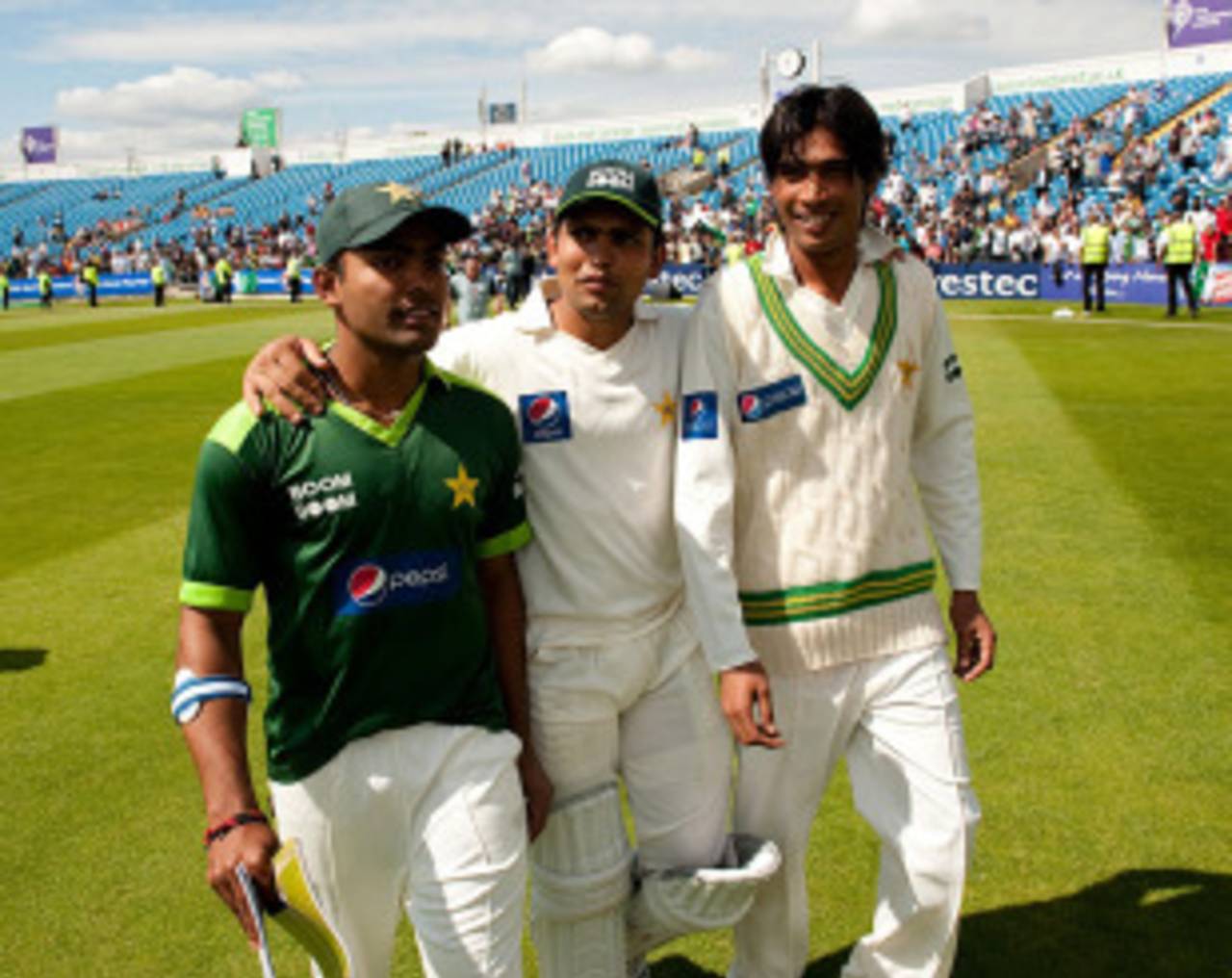Thank god for England v Pakistan
Tired of dead pitches, run gluts and off-field stories full of legalese? Here are two teams: one bursting with young talent and the other, willingness to engage in battle
Harsha Bhogle
30-Jul-2010

Pakistan's young players are a refreshing sight in a scene littered with embittered seniors and reactionary politicians • PA Photos
My sports pages are besieged by lawyers these days. They are not all bad fellows but their presence in headlines is usually a harbinger of doom or a full-blown conflict. In an ideal world, lawyers would take off their jackets, pull on a round-neck tee and a pair of sneakers and shriek and despair like any other fan.
And so the IPL is mired in legalese, there are calls for a recusal (which sounds like Sarah Palin or George Bush trying to say no), there are calls for Supreme Court judges, and even Cricinfo is being forced to turn to legalese: "The core issue of recusal of two members from the panel was debated..." Meanwhile, the image of the IPL, India's only major sports brand, takes a beating amid adjournments and myriad motions.
Elsewhere, an 83-year-old lady is moving the courts to allow her to head one of the factions hoping to run Indian hockey. Where a goal might have been considered a fair objective, a stay order is greeted with celebration. The Commonwealth Games are in the news only for water pouring into new stadiums, for swimmers tripping over unfinished construction, and for incurring costs that bear as much relation to the budget as my cover drive does to Sachin Tendulkar's.
And the Sinhalese Sports Club ground has joined a few others (Antigua, Ahmedabad…) where a lawyer is genuinely needed: to get a stay against curators preparing pitches that will make bowlers extinct faster than the Bengal tiger. At the time of typing this, eight wickets have fallen in three days and a century is news only if it is missed.
Ironically providing relief is a team that is normally in the news for parliamentary committees and senate commissions enquiring into its activities. But circumstances have thrown Pakistan a great opportunity, among the biggest in its history. It is an opportunity only they can spurn, for their cricket writes more baffling scripts there a writer of soaps could dream of.
England and Pakistan are teams on the way up, at least for now, and their contest should be one for sports lovers. Their traditional opponents, Australia and India, rated above them, are faltering with what engineers might call structural defects
With senior players under a cloud, and some unsure of whether they are active or retired, a group of youngsters with the most incredible ability has been thrown together. Three young fast bowlers, and doubtless a dozen more tucked away in fertile bylanes, are making the world sit up and take notice; enjoying using the Dukes ball and making it curve nastily. A young left-armer has emerged, who has the potential to cause batsmen a lot of distress, as have a swarm of young batsmen who take to cricket and its attendant pressures with the ease of a poet composing a ghazal. These are young, uncluttered - dare one say unspoilt - minds who are thankful for the opportunity of playing for their country. It seems, suddenly, in Pakistan cricket as if things were just meant to be; even though it is no more than a couple of weeks since their new captain quit! Now all they need is a young allrounder to bat at No. 6, a wicketkeeper who doesn't enjoy controversy, and some parliamentarians who can stay away from cricket. It will be criminal to miss an opportunity like this.
But arrayed against them are a group of cricketers, hitherto considered malleable, who seem to have acquired steel implants. England are playing the toughest cricket I have seen since Nasser Hussain brought sides to the subcontinent. From a distance, there seems a culture of openness; a gentleman captain and a tough coach, some underrated but resolute batsmen, a mighty fine spinner, and three seamers who keep picking up wickets. More than anything else, this looks a side willing to stamp on an opponent when he is down, where earlier they seemed happy putting up a temporary fight.
England and Pakistan are teams on the way up, at least for now, and their contest should be one for sports lovers. Their traditional opponents, Australia and India, rated above them, are faltering with what engineers might call structural defects. So maybe we should enjoy that while the lawyers roll up their sleeves in India and curators continue to bury bowlers in Sri Lanka.
If India searched for bowlers with the zeal with which they look for legal loopholes, and bowlers didn't vanish into the hungry pits that keep popping up everywhere, India's sports pages would make better reading.
Harsha Bhogle is a commentator, television presenter and writer